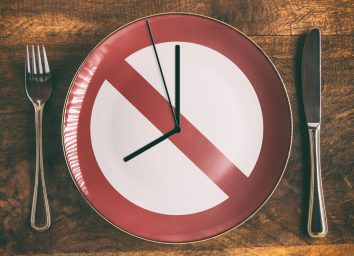What Happens To Your Body On The Intermittent Fasting Diet

Nutritionists love the idea of intermittent fasting. The diet harnesses humans' natural biology to lose weight and improve overall health. To intermittent fast, you'll have either an 8- or 12-hour window when you can eat what you'd like throughout the day, and then you fast for either 12- to 16-hour overnight. Because this eating pattern is more of a lifestyle change than a diet, you should know what happens when you fast before you try it.
As we mentioned, intermittent fasting is not technically a diet. It actually brings us back to our ancestral roots. Experts posit that humans may have evolved too fast for our current eating patterns.
"Food was scarce for our hunter-gatherer ancestors, and their bodies adapted to go for long periods of time between eating," says Danielle Schaub, MS, RD, CDN, a registered dietitian at New York-Presbyterian/Weill Cornell Medical Center. "Though we have almost unlimited access to food now, our bodies aren't meant to be in a constant digestive state, and there are a lot of good things that happen in a fasted state."
What are a few of those good things? We asked Schaub and other registered dietitians for the low-down on what happens when you fast.
STAY INFORMED: Sign up for our newsletter to get the latest food news delivered straight to your inbox.
Your metabolism speeds up
"Short-term fasting can increase metabolic rate. That's because levels of [the hormone] norepinephrine increase during a fast," says Erin Palinski-Wade, RD, CDE, author of Belly Fat Diet For Dummies.
Since metabolism is the rate at which your body burns calories—and that rate is mostly fixed, unfortunately, by your unique composition—being able to kick your metabolism into high gear through fasting might allow you to burn more calories.
Just be mindful of how long you fast, though. Palinski-Wade says fasting for up to 48 hours can increase metabolism, but extended fasting longer than that can have the reverse impact on your metabolism as your body races to conserve energy and prevent starvation.
You burn more fat
On a normal diet that includes carbs, your body will usually burn glucose from those carbs instead of burning fat, but Cynthia Thurlow, a nurse practitioner specializing in fasting and nutrition says this isn't the best way.
"While fasting, your body is given the opportunity to utilize fat stores for energy, a process signaled by lowered insulin levels," she says. "This is a great thing. It's incredibly efficient and it is how our bodies are designed to work."
If you've ever wondered why it matters if you burn glucose versus fat (calories are calories, right?), it's because leftover glucose burned for energy gets stored as fat cells. Over time, it could lead to weight gain or other health problems.
Your digestive function improves
Are you giving your digestive system the rest it needs to do its job? If you're eating frequently over the course of a 16- or 18-hour day, maybe not.
"Digestion is the most taxing system in our body…it takes a lot of work!" says nutrition coach Megan Kober, RDN. "When you allow your digestive system to rest, your body can go to work on breaking down not only fat cells but also unwanted immune cells in the body."
Because of the cell breakdown made possible by fasting, Kober says it's the most efficient way to detox. Yes, even more than all those juice cleanses or pricey supplements that make questionable promises about removing "toxins."
You might lose weight
Be honest: you're considering doing intermittent fasting because you want to lose some weight. Hey, we've all been there! Thankfully, there is a lot of emerging research on fasting that suggests it could be a scientifically-backed way to lose weight, right along with calorie reduction.
According to Palinski-Wade, fasting not only promotes a calorie deficit but also increases your metabolism (which we've already told you!). But that's a real one-two punch for weight loss.
Two recent 2019 reviews of studies, one from Current Obesity Reports and one from Nutrients, found that intermittent fasting (or time-restricted eating) led to similar results in clinical trials as its more traditional calorie restriction counterpart.
There is, of course, one caveat. "Some people gain weight by fasting, but that's typically related to their food choices," says Thurlow. "Think highly-processed, standard American diet versus a nutrient-dense diet focused on protein, healthy fats, and appropriate carbohydrates."
So go ahead and fast, but still focus on clean, healthy eating for best results.
Fasting retrains your body
Thanks to our hunter-gatherer ancestors, our bodies are made for intermittent fasting. But thanks to our modern way of eating, our bodies have totally forgotten this fact. If we retrain our bodies to adapt to periodic fasting again—or get better at shifting between carb-burning mode and fat-burning mode, as Schaub puts it—we can reap some serious benefits, including weight loss.
Thurlow, agrees: "The lower insulin levels that happen with fasting allow us to have better cognition and mental clarity, as well as tap into something called autophagy, which is like spring cleaning of diseased and disordered cells."
You maintain muscle mass
Trying to build muscle and lose weight? Traditional dieting could make that hard to accomplish. Kober says fasting has shown itself to be more effective at preserving lean muscle mass than calorie restriction. What's more, muscle mass is directly correlated with metabolic rate. That means the more lean muscle you have, the more calories you burn at rest.
"Losing weight via fasting versus losing weight via calorie restriction means that you will be more likely to lose actual fat, not fat and muscle mass," Kober says. "This leads to a more desirable body composition and a higher resting metabolic rate (which is a fancy term for burning more calories while sitting on the couch doing nothing)."
You eat less overall
Generally speaking, practicing intermittent fasting means you don't have to count calories (you can, but it's not required). Why? Because there's only so much food most people can eat within a limited time frame, so counting—or restricting—calories isn't necessary.
"Restricting calories to a certain eating window helps reduce overall intake, further helping with weight loss," says Schaub.
Basically, if you're listening to hunger cues, your body will tell you how many calories you need. But you still have to be mindful here: "You have to plan your fasts carefully," says Palinski-Wade. "If excessive hunger after a fast leads to binge eating, you will ultimately end up eating more calories and gaining weight."
Your insulin lowers
Schaub offers a quick biology lesson: after you eat, carbs are digested into sugars, then those sugars enter your bloodstream and trigger a release of insulin. Insulin's job is to move sugar from the bloodstream to your cells. But insulin also blocks fat cells from releasing fat, which means your body can't burn fat when insulin levels are high. It's only when the sugar is relocated into the cells that insulin levels drop again.
The takeaway? "The body is only able to release fat to be burned when insulin levels are low, which happens when you haven't eaten in a few hours," says Schaub. "If you snack frequently, your body is simply not able to burn fat." Instead, rely on a few filling meals a day, like these 19 High Protein Breakfasts That Keep You Full.








